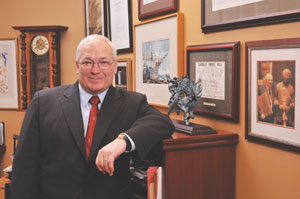Not content with inspiring others with their military feats, veterans have won a victory in the legal arena through a class action against government clawbacks on their pensions. Final approval of an $887-million settlement that includes retroactive payments and a scholarship fund of $10 million will leave 7,500 veterans better off and give a morale boost to those fighting similar battles at home.

The settlement of the Dennis Manuge class action went before Justice Robert Barnes of the Federal Court on Feb. 14, 2013. It deals with the reduction of long-term disability benefits by the amount of the monthly Veterans Affairs Canada disability pension paid under the Pension Act. McInnes Cooper filed the case in March 2007. While there remains some controversy over legal costs, the settlement has garnered praise from veterans’ groups such as the Royal Canadian Legion.
Andrea Siew, director of the service bureau for the legion’s dominion command, spent 28 years in naval intelligence before taking on an advocacy role with the organization. She applauds the direction the government took after a ruling on May 1, 2012, when Barnes stated that monthly Pension Act payments awarded to veterans with disabilities prior to April 2006 weren’t income and the government therefore couldn’t deduct them from the other benefits. The government chose not to appeal but instead negotiated a settlement with the assistance of University of British Columbia president Stephen Toope.
“They stopped the unfair practice, which has a huge impact in terms of the amount of money available to veterans,” says Siew. “They also made it retroactive — the first time that government has provided retroactive relief.” She also praises the decision to include everyone eligible in the deal. “There is no cut-off date,” she notes.
Siew believes the settlement may set a precedent in other cases involving changes to policies and programs because of unfairness. “The whole issue of retroactivity is now firmly on the table.” She hopes it will lend weight to the legion’s battle over funeral and burial benefits that has yet to reach the courts. That dispute deals with both eligibility and amounts in the government’s provision of a funeral services grant.
Currently, the government pays $3,600 for a funeral to low-income war veterans with less than $12,000 in assets. “The average cost of a funeral in Canada is $7,000 to $12,000 and it is not available to post-Korean War veterans,” says Siew. “It caveats and excludes many and is very proscriptive. It can only be used for various specified costs.”
While the legion is concentrating on the policy perspective at present, the pension settlement gives Siew confidence that a legal approach can be successful. “It shows you can challenge the government. It takes a long time, but you can win.”
The most immediate beneficiary of the decision may be the RCMP in terms of its own class action challenging exactly the same clawback as the military. McInnes Cooper is on that file as well and the legion is advocating on the RCMP’s behalf. “We have already gone forward to the government and said that if it is an unfair practice for the Canadian Forces, then it should be considered an unfair practice for the RCMP as well,” says Siew.
Another legal matter that may get a boost is the Supreme Court of British Columbia class action lodged by Miller Thomson LLP on Oct. 30, 2012, challenging the 2006 new veterans’ charter. The statement of claim alleges the charter serves to reduce soldiers’ recompense by up to 50 per cent over their lifetimes and is therefore discriminatory and contrary to s. 15 of the Charter of Rights and Freedoms.
Don Sorochan of Miller Thomson says he takes heart from the disability settlement. “They spent seven years with the usual Department of Justice feet dragging but when they finally got to the merits, the government gave in. Hopefully, they have learnt the lesson that stalling tactics don’t work at the end of the day. We hope for a more constructive approach.”
So far, the Miller Thomson
pro bono team has had only minimal contact with the government but lawyers learned in the last few weeks that it plans to oppose the certification motion. “Admittedly, ours is a much more complicated case,” says Sorochan. “There are not just legal issues but constitutional issues. Still, we hope there will be some movement as the merits show we are justified.”
The parties are jointly applying for judicial case management. “Our position will be that it should be treated with some urgency,” says Sorochan. “In the Halifax case, the veterans had already been approved for payments. In our case, many people haven’t been given proper compensation at all. They are suffering from that on a day-by-day basis.”

